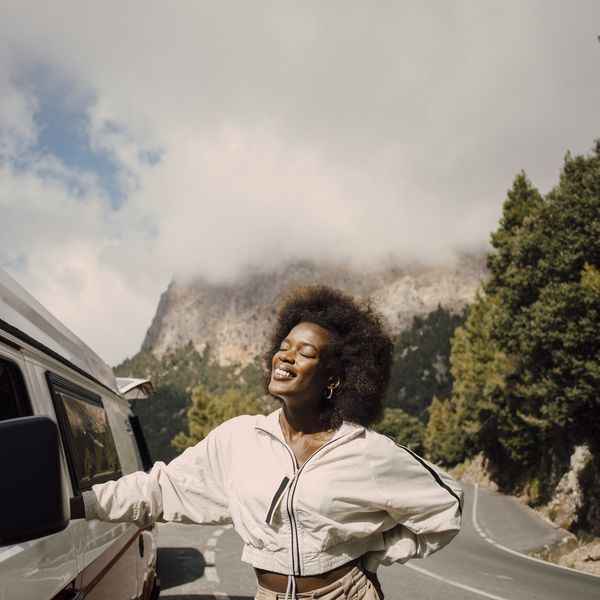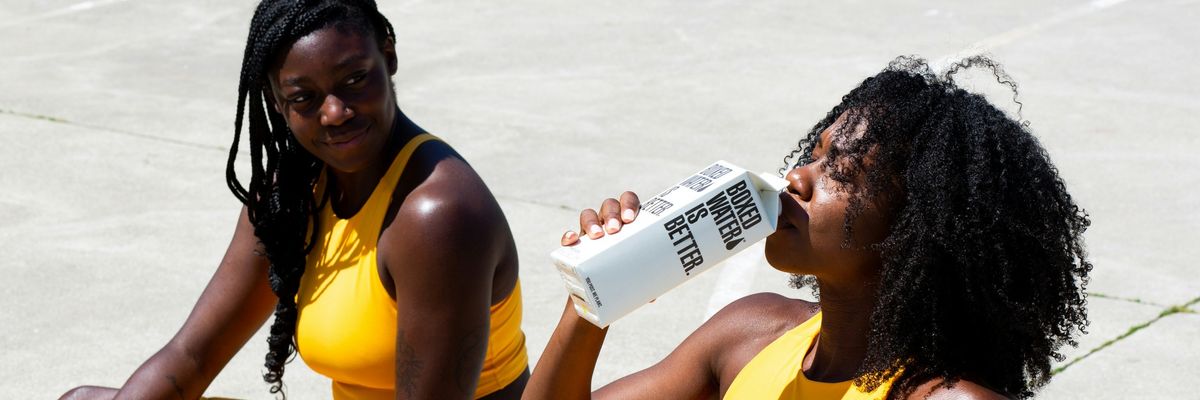
"When I think of colorism, I think of light-skinned versus dark-skinned and, being that I am a black woman, my thoughts definitely go towards my own community. I think of instances where attractiveness and perceived worthiness go hand-in-hand, just because of the shade of my complexion. I think of lighter-skinned people being automatically held at a higher value simply because they aren't dark-skinned."—Sheriden Chanel, managing editor, xoNecole
I find it pretty fascinating (and also a sign) that, as I'm sitting down to pen this, the second episode of the fourth season of Queen Sugar is on. The scene that I'm watching consists of Charley—a biracial woman—reading a passage out of her sister Nova's—a dark-skinned woman's—book.
In it, the topic of colorism comes up. Here's just a part of what Charley read back to Nova that Nova wrote about her:
"My sister. Born to privilege, raised with wealth and half-bathed in whiteness, used her light skin as her shield and her sword. Weapons, in every room she entered, every deal she made…she used her honey skin to keep her safe, all the while keeping her complicit in the continued oppression of Black bodies."
Colorism. In this case, it's not just between a light-skinned and dark-skinned woman, but also between a light-skinned woman who happens to be biracial. Bookmark that, OK? I'll be coming back to it. But first...
The Pop Culture of Colorism
Before going any deeper into this, please forgive me in advance, because colorism is something that deserves to be a docu-series and a five-day seminar and a series of TED Talks and…and…and. Yet here, there are simply not enough inches to give the topic all of the unpacking that it truly deserves; not even close. Still, with headlines like "Scottie Beam Talks Light Skin vs. Dark Skin Colorism, the Humanitarian Crisis in Sudan & More [Video]" "Mathew Knowles Talks Colorism's Role in Beyoncé's Music Career" and (sigh) "Tory Lanez Responds to Claims He Staged Video Allegedly Showing Colorism (UPDATE)" that were published, all in one week, my editor and I agreed that while this can lean towards being a "touchy subject", that doesn't mean that we shouldn't acknowledge it.
And by "acknowledge", I just mean, let Black women know that I/we see you. Light, in between light and dark, and dark-skinned alike. We know that colorism is something that shouldn't be ignored, sugar-coated or skirted around, especially within our own community. We get that although it can be uncomfortable, and even sometimes painful to explore the issues of color, it must be done. It's irresponsible not to. Full stop.
That said, I want to initially approach the traditional definition of the word from this angle. Because I am (mostly) a relationships writer, I think colorism is quite… "bold" is the word that immediately comes to mind when it comes to the dating scene; especially the celebrity dating scene. As a popular YouTube blogger by the name of Paris Milan—who regularly addresses the issue of colorism (along with other beautiful sistahs like Leah Gordone, I Am Eloho and Chrissie, who is the publisher of the magazine Divine Dark Skin)—and I were discussing her feelings about colorism, we took a moment to try and think of famous Black men who were with dark-skinned Black women. We both sat in silence for quite a while. A few came to mind (Idris Elba, Dwyane Wade, Keith Powers), but what we agreed on is that we shouldn't have had to strain our brains to come up with some. "I think there is something to be said for preference," said Paris.
Then after a pause, she continued, "I also believe that it often is a mask for colorism. It's very interesting that a lot of Black men will make sure to say that they love Black women, but we never see them with us. It's like they know that they have to cater to us in some way because we are their audience, but their words don't line up with their actions. In their personal life, women are light, biracial or white."
"To me, when your message doesn't line up with your life, that's when it crosses over into pandering. And there is certainly a lot of that. And, if you don't want to discuss it, you're deflecting."
I agree. Colorism definitely goes beyond relationships, though. Paris and I also discussed how dark-skinned characters like Pam (from Martin) and Maxine (from Living Single) may have made their shows in a lot of ways, but they were also loud and, as Paris put it, "less feminine than many of the other characters". Was that by design? Or even if you fast forward to now, many Black people don't feel like the Blackish spinoff Mixedish is must-see TV because "Blackish is already mixed", and as another Black YouTuber by the name of Masani Musa said, "Biracial people are dominating Black spaces in entertainment".
Then there's music visuals. When's the last time you saw a chocolate (a descriptive that Paris said made her feel "delectable") sistah as the romantic lead? Or even when you look at the pics from the nights when Miss USA, Miss Teen USA and Miss America won their titles, why is it that the two light-skinned women (Cheslie Kryst and Kaliegh Garris who also happen to be biracial) didn't straighten their hair, but Nia Franklin, the dark-skinned winner, did? Was that personal preference or pressure? Colorism is everywhere, y'all. And I do mean everywhere.
The "Lighter" Side of Colorism
Remember how, at the top of this piece, I asked you to "bookmark" the fact that Charley was not only light-skinned but biracial? I think her experience has its own subtle sides of colorism. Tia Mowry-Hardrict released a semi-recent video entitled "Growing Up Multiracial. It's COMPLICATED!" and, last April, actor and activist Jesse Williams (whose mother is white and father is Black) shared with Sway his thoughts on colorism. At the 26:00 mark in the interview, he speaks on the fact that he finds it to be "unnecessary" and "self-imposed complication" to complain about the challenges of being biracial, although he admits that it can be confusing to unpack.
"We live in America," Jesse expounded. "This country's racial politics are so poisonous and clear. Race doesn't exist scientifically, but it exists in real life…lived experience matters. Your personal experience matters and I'm only a product of mine. It feels like I'm almost…gonna sound insensitive, but it's a lot harder to be f—kin' Black. Do you know how easy it is to be biracial and mixed?...I imagine it is a lot more confusing to be dark-skinned. And be told that you're trash, but we also want to worship you and be like you. But we hate you. I've gotten so much in my life because I'm light, because I have light eyes. It's way easier, period."
I wonder. When Jesse speaks of the privileges that he has or how accepted it is that he feels in mainstream society, how much of that is about how "light" he is vs. how much white that is in him? Is there too an issue of colorism as it relates to light-skinned Blacks and biracial individuals? Are they automatically one in the same? Have we forgotten race-related facts like, "Not only does the one-drop rule apply to no other group than American blacks, but apparently the rule is unique in that it is found only in the United States and not in any other nation in the world"?
Do we realize the damage that this rhetoric alone has done?
My godchildren's mom, Rissi Palmer, an artist and activist, is a light-skinned Black woman, would probably not easily pass the South African hair "pencil test" (another byproduct of racism). And yet, she finds it off-the-charts offensive whenever people assume that she must be mixed or when she hears that she has "good hair".
"I'll admit that I have some PTSD from my childhood when it comes to this," shares Rissi. "But I didn't really struggle until I went to a school that had a lot of Black children in it. There is when I was told that I wasn't 'black enough'. Honestly, I think the white kids listened in and caught on to the fact that within my own ethnicity, there were issues with color. Then they started to mimic statements like 'You're not Black Black.' Do I think that dark-skinned Blacks have it much harder? Definitely. But I do think that light-skinned Blacks have been infected by whites and their constant attacks on us as a whole too. At the end of the day, they want us all to not feel like we are good enough. Skin tone and hair texture doesn't matter, so long as we hate ourselves—and each other."
Preach.
Colorism Divides. However, Talking About It Does Enlighten.
"So many of us are brainwashed by white supremacy and don't even know it," Paris states. "As a result, a lot of us project colorism, without realizing it. But here's how you can know if you've got issues with colorism. If you associate skin tones with someone being better or more attractive. If you use phrases like 'good hair' to describe a person. If you're surprised when someone with a dark complexion excels in a particular field, you have colorism issues, no doubt about it. And you know what? Gone are the days when dark-skinned people are afraid to tackle these topics head-on. We don't have to conform to any kind of standard of beauty or expectation and we're going to spread awareness to let others know that they don't have to either. Black is beautiful. That's a complete sentence."
After I got off of the phone with Paris, I put on a song by a friend of mine named Classik Levine who's an independent artist in Louisville. It's called "DSGWAB" and that stands for Dark Skin Girl with a Body. I remember when it first came out and some light-skinned women were like, "Why does he have to single out dark women?" Meanwhile, I was more like, "Where are your T-shirts, so that I can buy them for some of the chocolate women that I know?" I think I responded that way because my mother is light. My father was chocolate. My complexion is somewhere in between.
My point? We all are Black. We all deserve to be seen, honored and celebrated for being Black. Not one more than the other. Period.
Articles like "The Varying Skin Colors of Africa: Light, Dark, and All in Between" are blaring reminders that our diversity—all of the hues of Blackness—is a part of what makes us…us. Colorism blinds us to this very fact because it's designed to. That makes it a cancer. A disease. Something that works against, not for us, as a people. And yes, we must talk about it. Not deflect. Not duck and dodge. We must hit it straight on. Consistently so. How can we heal if we don't?
"I don't think colorism is talked about enough," shares Sheriden. "In fact, I've heard members of my community say that by talking about things like that, we make ourselves more divisive. I don't think acknowledgement in that regard is inherently divisive, as much as it's bringing awareness to an aspect of the community that might feel undervalued and underserved."
If you don't agree with that, you already know what I'm about to say. You, sis, have a real problem when it comes to colorism; not a little bit, but period. And there ain't nothin' good, healthy, positive or beneficial about that. Not even if you believe that you only have a so-called "one drop" of it in you.
Featured image by Getty Images.
- 5 Reasons To Talk About Colorism – Colorism Healing ›
- 452: A Conversation About Colorism & Impact With Fleure Maricaux ... ›
- The Difference Between Racism and Colorism | Time ›
- Opening up the conversation on colorism - New Day Northwest ... ›
- The Colorism Conversation Continues in 'Light Girls' - Video ›
- With 'Shades of Black,' The Guardian Enters the Colorism ... ›
- The Colorism Conversation Continues in Light Girls | Light Girls ... ›
This Is How To Keep 'Holiday Season Stress' From Infecting Your Relationship
Hmph. Maybe it’s just me, but it seems like there is something really weird happening in the fall season air (because winter doesn’t officially begin until December 21) that cuddle season is in full swing while break-up season is as well. In fact, did you know that break-ups are so popular during the holiday season that December 11 is deemed Break-Up Day?
The reasons why relationships shift around this time vary; however, I did both roll my eyes and chuckle when I read that a very popular one is because it’s an easy way to get out of getting one’s significant other a Christmas present. SMDH.
Anyway, I personally think that the less shallow folks out here may contemplate calling things “quits” or they at least distance themselves a bit from their partner (and what I’m referring to is serious relationships) due to all of the stress and strain that oftentimes comes with the holidays whether it be financial, familial, due to their tight schedules or something else.
Listen, I would hate for you and your man to miss the fun and happiness of experiencing this time of year, all because you are so overwhelmed or irritated that you can’t really enjoy it. That’s why I have a few practical tips for how to avoid allowing the typical holiday season stress from INFECTING your relationship.
Manage Your Expectations
 Giphy
GiphyUnmanaged expectations. If there is a main reason why the holiday season tends to be so stress-filled for so many people, I’d bet good money that this is the cause. And when you’re in a long-term relationship, expectations can manifest themselves in all sorts of cryptic and/or unexpected ways. You might have relatives who assume that you are going to be with them for Thanksgiving or Christmas when you have other plans in mind. You might be thinking that you are going to spend one amount for presents while your man is thinking something totally different. When it comes to scheduling, your signals may be crossed.
And you know what? To all of these scenarios, this is where clear and consistent communication come in. Don’t assume anything. Don’t dictate anything either. From now until New Year’s, mutually decide to check in once a week, just to make sure that you are both on the same page as it relates to the holidays and what you both are thinking will come along with it. The less blindsided you both feel, the less stressed out you will be. Trust me on this.
Set (and Keep) a Budget
 Giphy
GiphyOkay, so I read that last year, 36 percent of Americans incurred some type of holiday-related debt. Hmph. Last year, there was still some sense of normalcy in this country, chile, so I can only imagine what finances are gonna look like over the next several weeks. That said, since I don’t know a lot of people who don’t find being broke stressful, make sure that you and your bae set a budget and then stick to it this year — no ifs, ands or buts.
Because really, y’all — it doesn’t make sense to deplete savings and/or max out credit cards for a few days of giggles only to be damn near losing your mind because you don’t know how to make ends meet come Dr. Martin Luther King, Jr. Day.
And by the way, this tip doesn’t just speak to things like food and gifts; I also mean travel. If it doesn’t make a ton of sense (or cents) to be all over the place this year — DON’T BE.
Keep Matthew 5:37 at the Forefront
 Giphy
GiphyIf off the top of your head, you don’t know what Matthew 5:37 says, no worries, here ya go: “But let your ‘Yes’ be ‘Yes,’ and your ‘No,’ ‘No.’ For whatever is more than these is from the evil one.” That verse right there? Oh, it’s a boundaries lifesaver! I say that because do you see “maybe” or “I’ll think about it” in there? Nope. LOL. It says that you should tell people “yes” or “no” and leave it at that — and that complements Anne Lamott’s quote, “’No’ is a complete sentence” impeccably well. Yeah, you’ve got to remember that anything beyond a yes or no to a request is privileged information; you don’t owe anyone details or an explanation.
Besides, if you are really honest with yourself, when someone asks you something and you give a “Umm, let me think about it” kind of reply, more times than not, you already know what your answer is going to be — so why not let you both off of the hook? Give your response. Commit to that. And let everyone (including yourself) get on with their lives and schedules.
I promise you that when it comes to those holiday parties, you are pissing more folks off by not RSVP’ing or doing so and not showing up than just saying, “Thank you but not this year” off the rip.
Remember That Your Personal Space Is Privilege Not a Right
 Giphy
GiphyA friend of mine recently bought a new house and invited me over to come see it. He’s a single man with no children, so as I was taking in all of the space that he had, especially as I walked through his finished basement, I joked about relatives coming to live with him. “Hell no” and “absolutely not” were pretty much his immediate responses as he went on to say that some folks even had the nerve to be offended when he told them that he had no intentions on taking DNA in.
Ain’t it wild how people think that your stuff is their right? And yes, that brings me to my next point. Your home is your sanctuary space. If you want to host folks this year — cool. If not, ALSO COOL. Please don’t let folks (family included) guilt you into how they want you to act or even into what they would do if the shoe was on the other foot. You are not them — and as one of my favorite quotes states, “If two people were exactly alike, one of them would be unnecessary.” (A man by the name Larry Dixon said that.)
Hell, my friends? They know that I am good for sending them random things that they need or even want all throughout the year. Coming over to hang out at my pace, though. Uh-uh. Chalk it up to being a card-carrying member of the ambivert club yet I like keeping my living space personal — and I sleep like a baby, each and every night, for feeling that way.
Always remember that your space, your time, your resources, your energy and shoot, yourself period (including your relationship), are all things that are your own. You get to choose how, when and why you want to share them. The holiday season is certainly no exception.
Cultivate Some “You Two Only” Traditions
 Giphy
GiphyIt’s not uncommon for some couples to hit me up after the holiday season to “detox.” Sometimes it’s due to the financial drama (and sometimes trauma) that they experienced. Sometimes it’s because they allowed their relatives (especially in-laws) to get more into their personal business than they should’ve. More than anything, though, it tends to be because they didn’t get enough quality time together and so ended up feeling “disconnected.”
Please don’t let that happen. Listen, I’m not even a holidays kind of woman and yet, I will absolutely sit myself down with some hot chocolate and chocolate chip cookies to enjoy a Hallmark holiday film or two. Aside from the fact that most of them are lighthearted and sweet, I also like that they usually focus on couples loving on each other amidst all of the holiday beauty and ambiance — which is something that all couples should set aside some time to do.
Maybe it’s a vacation. Maybe it’s a staycation. Or maybe it’s my personal favorite, A SEXCATION. Whether it’s for a few days, the weekend or even overnight — don’t you let the holidays go by without setting aside time for you and your man to celebrate one another. Don’t you dare (check out “Are You Ready To Have Some Very Merry 'Christmas Sex'?”).
GET. SOME. REST.
 Giphy
GiphyI once read that 8 out of 10 people get stressed out over the holidays and 3 out of 10 lose sleep during to it — and when you’re stress-filled and sleep-deprived, that can absolutely lead to hypersensitivity, making mountains out of molehills and even not being in the mood for sex.
Your relationship can’t afford to go through any of this, so definitely make sure to prioritize rest. I don’t care how unrealistic it might seem during this time, sleep should never be seen as a luxury; it will always and forever be a great necessity.
That said, try to get no less than six hours of shut-eye in (check out “6 Fascinating Ways Sex And Sleep Definitely Go Hand In Hand”) and even ask your bae to take a nap with you sometimes (check out “Wanna Have Some Next-Level Sex? Take A Nap, Sis.”). Not only will sleep help to restore your mind, body and spirit but, when it’s with your partner, it’s an act of intimacy that can make you both feel super connected, even in the midst of what might feel like chaos.
___
Holiday season stress is real. Still, never give it the permission or power to throw your relationship off. Put you and your man first and let the holidays be what they are gonna be, chile.
Let’s make things inbox official! Sign up for the xoNecole newsletter for love, wellness, career, and exclusive content delivered straight to your inbox.
Featured image by Shutterstock
I wish I enjoyed drinking plain ole’ water. I don’t, though, and, at this point, I doubt that I ever will. It’s not something that I’m proud of or anything, but like I’ve said in other articles on this platform, to me, water is so damn boring; it’s literally like drinking “wet air.”
That doesn’t mean I don’t accept that it’s a “necessary evil” being that we all are made up of so much water and being dehydrated (which is something that a lot of us are) can cause so many health-related issues, including blurred vision, muscle cramps, dried skin, fatigue and even moodiness.
That’s why, over the years, I’ve been intentional about figuring out ways to get more agua into my body without feeling like it’s a chore or something to dread. And now, I want to pass some of those hacks on to you, just in case you happen to totally relate to where I am coming from.
If something that you want to do more of right through here is get extra H2O into your system, here are 10 tips that can absolutely help to make that possible.
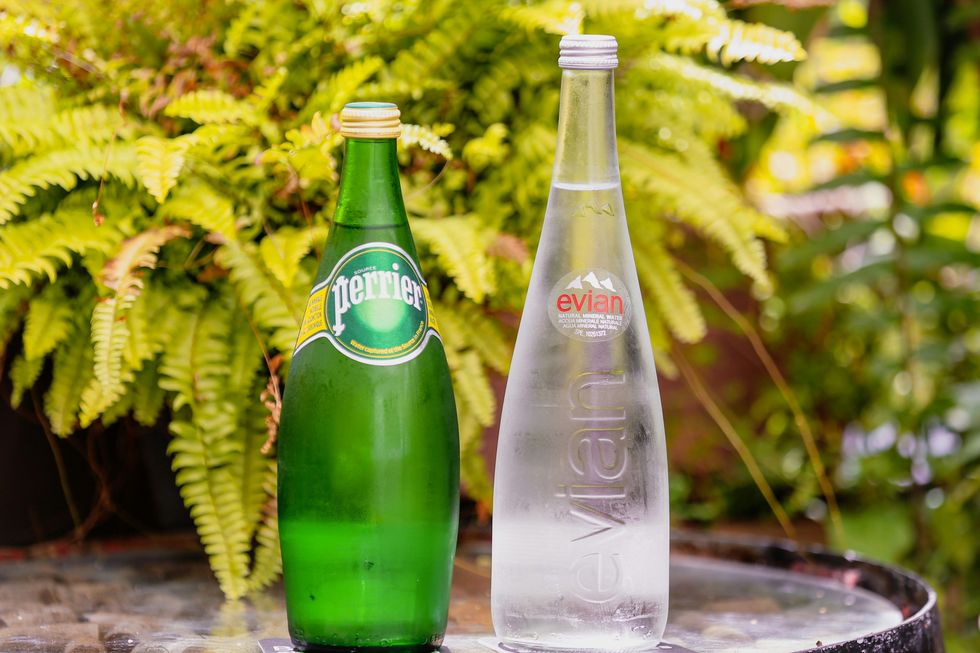
Unsplash
1. Invest in a Fun Water Bottle
There’s a far greater chance that you are going to drink water if you have a water bottle around you. So, cop yourself a cute one — one that will help you to stay motivated. A tumbler that I purchased some time back, just because I thought it was cute as hell, simply says, “Make Better Coochie Decisions” (amen?-LOL). Honestly, that doesn’t just have to apply to sex but how you treat your vagina overall — and that includes making sure that “she” has all of the fluids that she needs.
2. Try Some Sparkling Water or Mineral Water
At this point, I should take stock in Waterloo. It currently is my favorite kind of sparkling water and it has definitely made getting more water into my system easier to do. That’s because I will add some limes to it or a bit of fruit juice to it and that makes drinking water less “meh” for me. Another type of water that has bubbles in it is sparkling mineral water; it can also be beneficial since it contains magnesium, potassium and calcium.

Unsplash
3. Go Halfsies with Your Other Drinks of Choice
Speaking of making some all-natural soda (which is basically what happens when you add juice to sparkling water or sparkling mineral water), you can find yourself drinking more water while consuming less calories if you fill up your glass with half of your favorite fruit juice and half of some sparkling water. More times than not, the juice doesn’t even taste watered down. Try it before you doubt me.
4. Collect Some Infused Water Recipes
I’m forever gonna be a fan of infused water; that’s because it’s water that has fresh fruits and/or veggies in them — and it doesn’t get any healthier than that. Plus, infused water tends to take on the taste of whatever fruits or vegetables that you put into the water (if you let the stuff soak for a couple of hours), so that the water doesn’t taste so boring and bland. Wanna try a few recipes? You can check out some here and here.
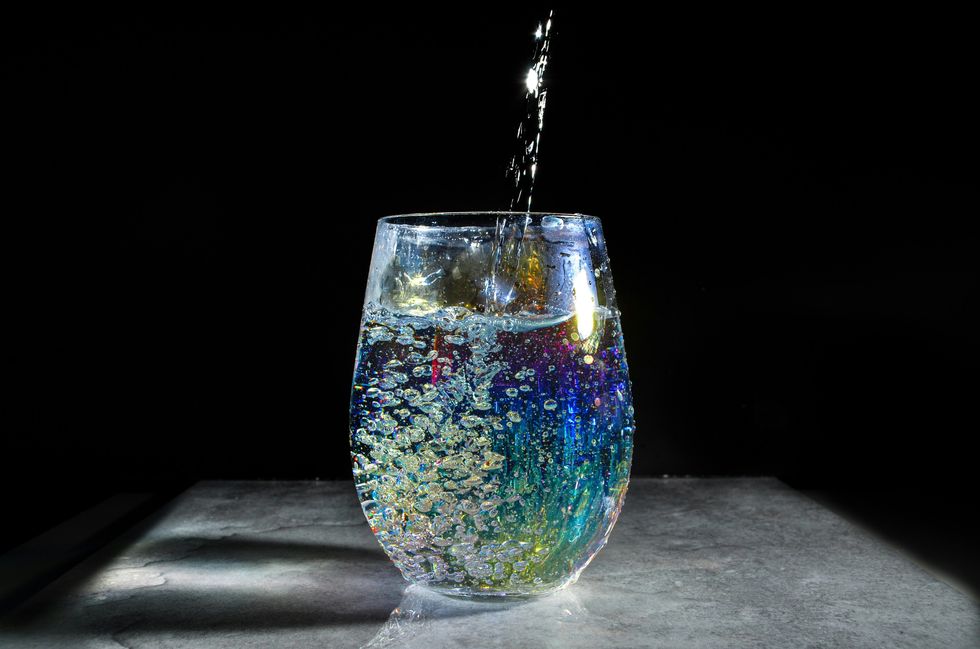
Unsplash
5. Make Slushies Instead of Smoothies
Are you someone who enjoys consuming smoothies? Well, if you want to get more water into your system, how about going with a slushie instead? Although it is true that some smoothies have water as a base, the most bomb ones use milk (or a milk alternative) or yogurt. Slushies, on the other hand, typically go with crushed ice (which is frozen water) instead. That said, some (pardon the pun) cool slushy recipes can be found here, here and here.
6. Use Water As Your “Drink Chaser”
Another great thing about water is it can help to keep you from overeating; it does that by causing you to feel full if you drink it while you are eating. And speaking of calorie-counting, if you don’t want to give up your favorite drink at mealtime, one way to keep from downing 2-3 glasses of it at a time is to use water as your “chaser.” What I mean by that is, after enjoying a glass of your favorite beverage, “chase it down” with a glass of water. That should satisfy your want for what you want without overdoing it.
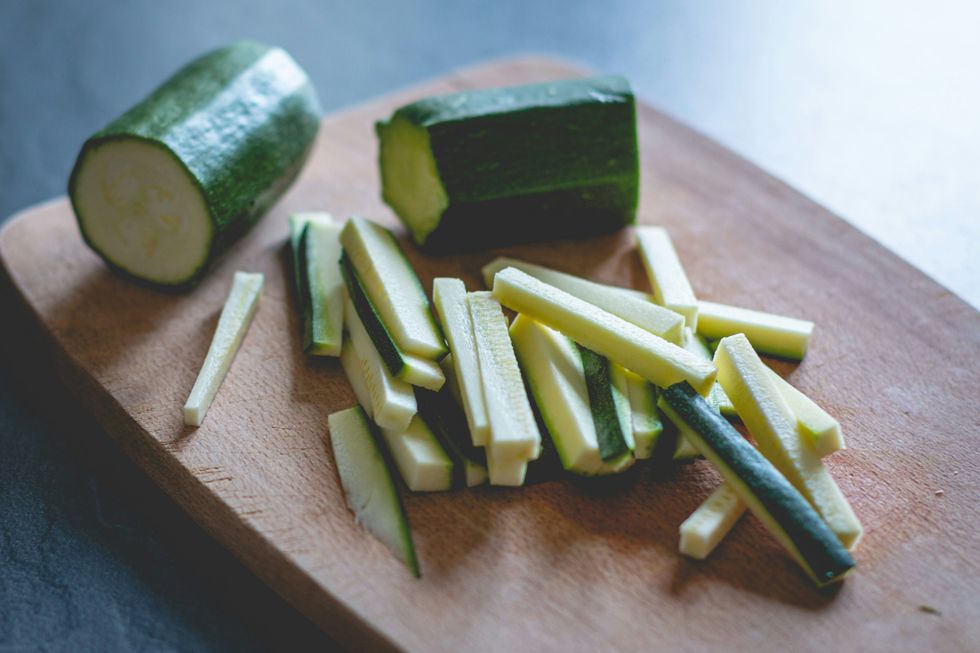
Unsplash
7. Eat Foods That Are High in Water Content
Another way to get more water into your body is to eat foods that have a ton of water in them. Some that top the list include lettuce (96 percent); cucumber (95 percent); zucchini (95 percent); celery (95 percent); strawberries (91 percent); cantaloupe (90 percent), and peaches (89 percent).
8. Have a Ball with Your Ice Cubes
Ice cubes are frozen water, right? That’s why most of us prefer to enjoy our drinks before the ice cubes melt because melted cubes water down whatever it is that we are consuming. And so, for this very reason, add more ice cubes to your drinks — and have fun making them. You can add juice, fruit and/or mint leaves while making your cubes. That way, they are aesthetically-pleasing; plus, they will also add more flavor to your water once the ice cubes actually melt.
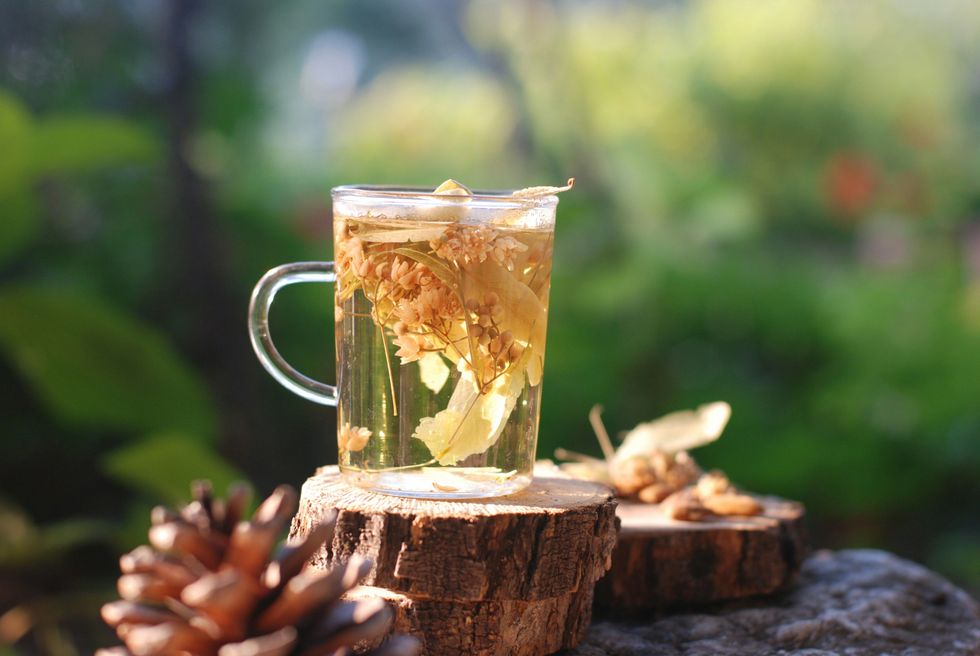
Unsplash
9. Add Some Non-Alcohol Cordial to Your Water
If you’re fine with just having a tad of taste in your water, why not add a bit of cordial to it? Cordial is simply a type of tonic, syrup or sweetener (that can contain alcohol or not) that can help to make your water more…interesting. Some alcohol-based cordials can be found here. Some non-alcoholic recipes are located here.
10. Technically, Herbal Tea Counts
Tea is always gonna be my thing. That’s why I’ve penned articles on it for the site like “10 Different Ways Herbal Teas Can Fit Into Your Beauty Regimen”, “10 'Uncommon' Teas You Should Add To Your Stash (& Why)” and “I've Got 10 Teas That Will Help You To Age (Even More) Gracefully” And y’all, if you want to get a lot more water into your system yet a tall glass of water only isn’t your — pardon the pun — cup of tea, make some iced herbal tea instead.
It’s basically water with some herbs tossed in and, if you add some honey or raw organic coconut palm sugar to it, it will be a really sweet treat that will still be extremely hydrating (and very healthy) for you.
Water that is a bit more exciting for you…now. LOL.
Drink up!
Let’s make things inbox official! Sign up for the xoNecole newsletter for love, wellness, career, and exclusive content delivered straight to your inbox.
Featured image by Unsplash








